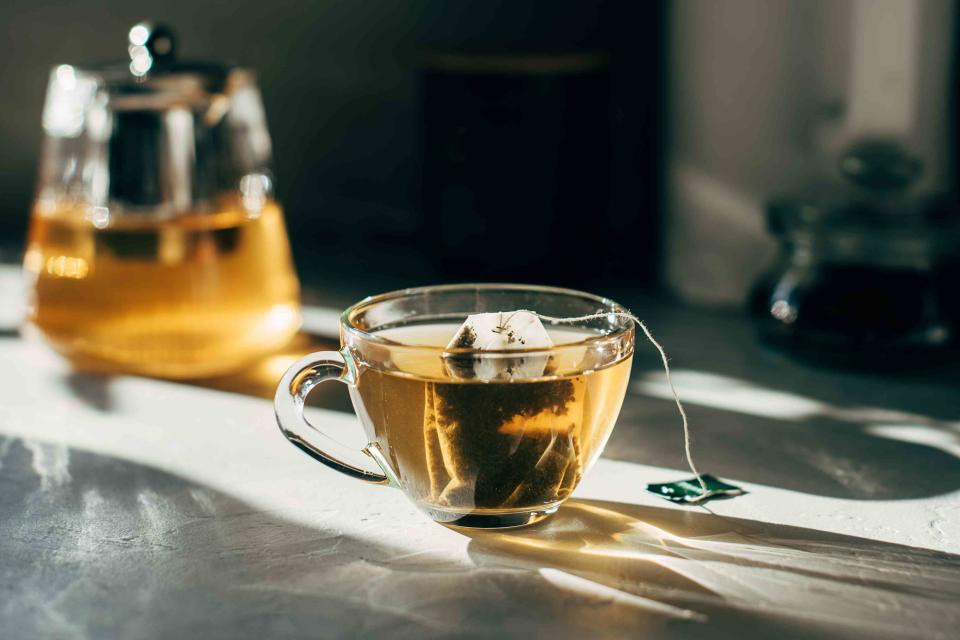This tea is a versatile addition to your diet that comes with significant health benefits.

Viktoriya Skorikova/Getty Images
Reviewed by Dietitian Maria Laura Haddad-GarciaReviewed by Dietitian Maria Laura Haddad-Garcia
When you have high cholesterol, you’re likely turning to your diet to make changes to help keep your cholesterol in check. Many have heard that upping fiber and reducing saturated fat and added sugar can positively affect cholesterol levels. Still, you may not have heard of one beverage that may also have a beneficial effect—tea. “Traditional tea contains antioxidants and offers health benefits such as cancer prevention and cholesterol reduction,” says Lisa Andrews, M.E.d., RD, LD, owner of Sound Bites Nutrition. Because of this, it can be a healthful addition to most diets.
In this article, dietitians weigh in on which is the best tea to help manage your cholesterol levels and how to enjoy it.
The Best Tea to Help Lower Cholesterol
Green tea may be one of the most beneficial teas when it comes to the potential for lowering cholesterol levels. Green tea, along with other types of tea, is a source of different polyphenols. “The polyphenols in the tea leaves provide antioxidants,” says Wan Na Chun, M.P.H., RD, CPT, owner of One Pot Wellness.
Some studies have found a connection between green tea consumption and a slight reduction in LDL cholesterol. Other studies have looked specifically at cholesterol levels in populations with other chronic conditions and have found a benefit when adding green tea to the diet.
More specifically, a small 2023 study found that people with type 2 diabetes and nephropathy (kidney disease) who drank three cups of green tea per day had a reduction in total cholesterol. The tea was consumed before a meal, and other factors in the diet were not controlled, so it’s impossible to know if the tea alone impacted cholesterol or if other dietary changes positively affected cholesterol. Still, the results are promising for green tea’s potential impact on total cholesterol.
A meta-analysis found similar results. This review found that consuming green tea may significantly help lower both total and LDL cholesterol (also known as “bad”). However, this study also had limitations, including not determining the ideal dosage of green tea to influence cholesterol levels.
Brooke Baird, RDN, owner of Simply Divine Nutrition, says the optimal dosage of tea required to help lower cholesterol levels is not clearly defined. “It can vary depending on individual factors such as age, health status and overall diet and lifestyle,” says Baird. It’s also important to note that many studies investigating the effect of green tea on cholesterol use a mix of green tea extract and green tea as a beverage. However, most of the studies are looking at the catechin concentration, which is the compound thought to have the most significant impact on cholesterol levels.
Catechins are flavonoids (a type of antioxidant) found in green tea. One of the most well-known catechins in green tea is EGCG. “Epigallocatechin gallate (EGCG) has been heavily researched and shown to be very effective in decreasing cholesterol,” says Umo Callins, M.S., RD, LD, CSSD, CPT, owner of Well Rooted Health & Nutrition. Green tea’s effect on lipid levels is thought to be multifaceted. In addition to preventing oxidation of LDL, which leads to plaque formation in your arteries, “Studies show green tea may significantly inhibit lipid absorption in the intestine, which is beneficial for lowering cholesterol,” says Chun.
More Research Is Needed
While drinking tea, particularly green tea, may be beneficial for lowering cholesterol levels, more research is still needed.
“The FDA has not approved any health claims for green tea beverages to reduce cardiovascular disease risk,” says Chun. It is best to consult your doctor before using tea to help manage high cholesterol, adds Chun.
Tea also contains caffeine, which can have adverse side effects when consumed excessively. “Drinking excessive amounts of caffeinated tea could lead to side effects like headaches, insomnia, irritability, dizziness and anxiety,” says Chun. Excess caffeine intake can also lead to gastrointestinal symptoms in some cases. However, green tea’s total caffeine content is lower than that of other caffeinated beverages like coffee. For reference, one cup of green tea contains around 30 milligrams of caffeine, compared to 100 mg in a traditional cup of coffee.
Other teas, particularly ones made of herbs, may also have unintended side effects. “Herbal teas can interfere with some medications like blood thinners, anti-inflammatories, antiseizure drugs, aspirin, blood pressure medications and diabetes treatments,” says Chun. It’s important to review your medications and any supplements or teas with your doctor.
Related: 4 Ways Caffeine Can Impact Your Medications, According to Dietitians
How to Safely Enjoy Green Tea
If you plan to add green tea to your daily routine, then it’s best to do so in a way that will help you increase the healthfulness of your diet as a whole. Avoid green tea with excess added sugar, which can negatively impact your overall health. Choosing a high-quality tea from a reputable company that tests for pesticides and other contaminants is also important. Many companies will provide their testing procedures on their website or will provide a Certificate of Analysis upon request. You can also look for companies that follow Current Good Manufacturing Practices (cGMP) to ensure quality.
For a delicious and refreshing drink, try this Green Jasmine-Mint Iced Tea with Lemon. For something warm and soothing, this Warm Honey Green Tea won’t disappoint you.
The Bottom Line
Tea can be a delicious, health-promoting beverage to add to your diet. Choosing tea, especially green tea, may have a beneficial effect on total cholesterol. However, it’s best to avoid drinking tea with added sugar to reap the greatest benefit. “While tea can be a part of a healthy lifestyle, it’s essential to consume it as part of a balanced diet and lifestyle,” says Callins. “Consult with a health care professional if you have any concerns or underlying health conditions.”
Related: The Best Tea for Lowering High Blood Pressure, Recommended by a Dietitian
Read the original article on Eating Well.
Source Agencies


